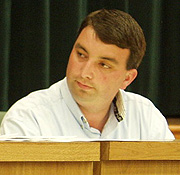Com Bailey in the shadows - works to kibosh 100
million dollar fed project
Columbia County, FL (posted
November 13,
2009)
By Stew Lilker
 Ignoring
the wishes of the majority of the County Commission and
the long standing support of this project by the
Commission, Board Chairman Stephen Bailey has been
working in the shadows to put the kibosh on the proposed
federal prison, which would pump over 100 million
dollars into the Columbia County economy.
Ignoring
the wishes of the majority of the County Commission and
the long standing support of this project by the
Commission, Board Chairman Stephen Bailey has been
working in the shadows to put the kibosh on the proposed
federal prison, which would pump over 100 million
dollars into the Columbia County economy.
According to Ms. Lynn Bannister of United
States Senator Bill Nelson's Office, Chairman Bailey was
recently in contact with her regarding the proposed
federal prison.
A confidential source has advised the Observer that
Commissioner Bailey asked Senator Nelson to help make
sure that Columbia County is not selected for the
proposed prison.
Links:
•
Bailey letter to Ander Crenshaw
•
Federal Register: Notice of Hearing
•
Harling's list of benefits
•
July 1, 2008 Board Meeting Minutes
• June 30, 2009 -
Fed. Bureau of Prisons wants to house 2500 illegal
aliens in Columbia County
• July
2, 2009 - Fed Bureau of Prisons listens to the public -
2500 bed illegal alien prison still uncertain
• Com Bailey in the shadows - works to kibosh 100
million dollar fed project
Also, without the consent or approval of the County
Commission, Chairman Bailey, on November 3,
2009, sent a letter to Congressman Ander Crenshaw,
asking for explanations that have been given over and
over again.
The Observer gets answers to questions you may have.
In an effort to get answers to the concerns of many
in Columbia County, your reporter spoke with Mike
Harling, of the Texas-based Municipal Capital Markets
Group, late yesterday afternoon, as he was sitting in an
airport waiting to catch a plane.
Observer: Mike, thanks
for responding to my e mail. I was wondering if you
could answer a few questions about the proposed federal
prison.
Mr. Harling: Sure.
Observer: Is Columbia
County still in the running for this project?
Mr. Harling: Very much so.
Observer: Some folks
think that there is not going to be a net increase in
jobs if the prison is located here.
Mr. Harling: If people are leaving
existing jobs to take these, it creates a vacuum.
Somebody is going t have to fill those other jobs. There
has to be a net gain one way or the other. I won't say
you won't get any people from out of the county, but I
would think, if history is on our side, you'll get
seventy percent of them from the county.
Observer: Is there
going to be any impact on the schools?
Mr. Harling: We are going to pay
property taxes. We are not going to have any impact on
the schools.
Observer: There was
some question whether or not they would be setting up
housing for people who visit the prisoners.
Mr. Harling:
That is not going to happen...
Observer: Why not?
Mr. Harling: The population in this
facility, as we told them all along and the Bureau of
Prisons has told them – is the criminal alien
population, which means they are people that are
undocumented people that have committed a crime against
the United States. If you use logic, the chances that a
family will want to be in the United States and follow
them – and if they do follow them and they show up at
this facility – they're going to be arrested for being
an illegal alien.
Observer: Because the
people that are being housed in the prison are illegal
aliens, so their families, by all rights, shouldn't be
here in the first place?
Mr. Harling: Correct. And they are not
in the facility for border infractions, they are there
for crimes against the United States – whether it's drug
running or anything else that has been through a Federal
Court. The chances of somebody following these people
are slim and none. We have these facilities in other
parts of the United States.
Observer: If the
project is awarded, how long is the contract?
Mr. Harling: The initial contract is for
four years with three two year renewal options, for a
total of ten, which is the maximum they can contract
for.
Observer: If it is not
renewed after four years, what happens? I guess you guys
end up with an empty facility.
Mr. Harling: Right. It is the same as if
Walmart built a warehouse and leaves. You have a big
empty building. It isn't any different than any other
commercial business. It is like the mall that is in the
middle of town that is half empty.
Observer: There has
been talk about the impact on the Hospitals. What if
somebody gets sick there?
Mr. Harling: If somebody gets sick there
the Federal Bureau of Prisons will pay whatever it takes
for medical bills, so there is no impact – it is a
benefit – they will be using your hospitals. These
people aren't going into the hospital for indigent care.
The Federal Bureau of Prisons pays all of those bills.
Observer: Is there a
clinic in the prison?
Mr. Harling: There will be a doctor and
dentist on call.
Mr. Harling: I sent you a
fact sheet on the prison. Did you get it?
Observer: Yes. Thanks
for speaking with me.

